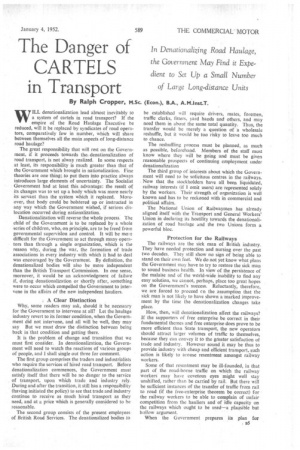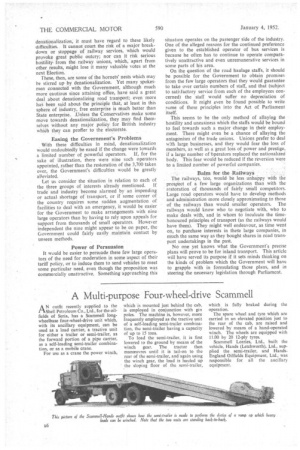The Danger of CARTELS in Transport
Page 39

Page 40

If you've noticed an error in this article please click here to report it so we can fix it.
In Denationalizing Road Haulage, the Government May Find it Expedient to Set up a Small Number of Large Long-distance Units By Ralph Cropper, M.Sc. (Econ.), BA., A.M.Inst.T.
WILL denationalization lead almost inevitably to a system of cartels in road transport? If the empire of the Road Haulage Executive be reduced, will it be replaced by syndicates of road operators, comparatively few in number, which will share between themselves all the main aspects of long-distance road haulage?
The great responsibility that will rest on the Government, if it proceeds towards the. denationalization of road transport, is not alway realized. In some respects at least, its responsibility is much greater than that of the Government which brought in nationalization. Fine theories are one thing; to put them into practice always introduces large elements of uncertainty. The Socialist Government had at least this advantage: the result of its changes was to set up a body which was more nearly its servant than the system which it replaced. Moreover, that body could be bolstered up or instructed in any way which the Government wished, if serious dislocation occurred during nationalization.
Denationalization will reverse the whole process. The child of the Government is to be replaced by a whole series of children, who, on principle, are to be freed from governmental supervision and control. It will be more difficult for the Government to act through many operators than through a single organization, which is the reason why, during the war, the formation of trade associations in every industry with which it had to deal was encouraged by the Government. By definition, the denationalized bodies will also be more independent than the British Transport Commission. In one sense, moreover, it would be an acknowledgment of failure if, during denationalization or shortly after, something were to occur which compelled the Government to intervene in the affairs of the new independent hauliers.
: A Clear Distinction ,
Why, some readers may ask, should it be necessary for the Government to intervene at all? Let the haulage industry revert to its former condition, when the Government did not intervene, and all will be well, they may say But we must draw the distinction between being back in that condition and getting there.
It is the problem of change and transition that we must first coniider. In denationalization, the Government will need to watch the reactions of various groups of people, and I shall single out three for comment.
The first group comprises the traders and industrialists who require the services of hired road transport. Before denationalization commences, the Government must satisfy itself that there will be no danger to the service of transport, upon which trade and industry rely. During and after the transition, it still has a responsibility (having initiated the policy) to see that trade and industry continue to receive as much hired transport as they need, and at a price which is generally considered to be reasonable.
The second group consists of the present employees of British Road Services. The denationalized bodies to be established will require drivers, mates, foremen, traffic clerks, fitters, yard hands and others, and may need them in about the same total quantity. Thus, the transfer would be merely a question of a wholesale reshuffle, but it would be too risky to leave too much to chance.
The reshuffling process must be planned, as much as possible, beforehand. Members of the staff must know where they will be going and must be given reasonable prospects of continuing employment under denationalization The third group of interests about which the Government will need to be solicitous centres in the railways. Now that the stockholders have all been liquidated, railway interests (if I omit users) are represented solely by the workers. Their strength. of organization is well known and has to be reckoned with in commercial and political affairs.
The National Union of Railwaymen has already aligned itself with the Transport and General Workers' Union in declaring its hostility towards the denationalization of road haulage and the two Unions form a powerful bloc.
Protection for the Railways
The railways are the sick man of British industry. They have needed protection and nursing over the past two decades. They still show no sign of being able to stand on their own feet. We do not yet know what plans the Government may have to try to restore the sick man to sound business health. In view of the persistence of the malaise and of the wdrld-wide inability to find any easy solution, we cannot, perhaps, place too great hopes on the Government's success. Reluctantly, therefore, we are forced to proceed en the assumption that the sick man is not likely to have shown a marked improvement by the time the denationalization changes take place.
How, then, will denationalization affect the railways?
If the supporters of free enterprise be correct in their fundamental themes and free enterprise does prove to be more efficient than State transport, the new operators should attract larger volumes of traffic to themselves, because they can convey it to the greater satisfaction of trade and industry. However sound it may be thus to provide industry with cheap and efficient transport, such action is likely to arouse resentment amongst railway workers.
Some of that resentment may be ill-founded, in that
part of the road-borne traffic on which the railway workers may have covetous eyes might well stay unshifted, rather than be carried by rail. But there will be sufficient instances of the transfer of traffic from rail to road (if the free-enterprise theorem be correct) for the railway workers to be able to complain of unfair competition from the hauliers and of idle capacity on the railways which ought to be used—a plausible but hollow argument.
When the Government prepares its plan for
denationalization, it must have regard to these likely difficulties. It cannot court the risk of a major breakdown or stoppage of railway services, which would provoke great public outcry; nor can it risk serious hostilityfrom the railway unions, which, apart from other results, might lose it many valuable votes at the next Election.
These, then, are some of the hornets' nests which may be. stirred up by denationalization. Yet many spokesmen connected with the Government, although much more cautious since attaining office, have said a great deal about denationalizing road transport; even more ha k' been said about. the principle that, at least in this sphere of industry, free enterprise is much better than State enterprise. ,Unless the Conservatives make some move towards denationalization, they may find themselves without any major policy. for British industry which they can proffer to the electorate.
Easing the Government's Problems
With these difficulties in mind, denationalization would undoubtedly be eased if the change were towards a limited number of powerful operators. If, for the sake of illustration, there were nine such operators appointed, rather than the restoration of the 3,700 taken over, the Government's difficulties would be greatly alleviated.
Let us consider the situation in relation to each of the three groups of interests already mentioned. If trade and industry become alarmed by an impending or actual shortage of transport, or if some corner of the country requires some sudden augmentation of facilities to deal with an emergency, it would be easier for the Government to make arrangements with nine large operators than by having to rely upon appeals for support from thousands of small operators. However independent the nine might appear to be on paper, the Government could fairly easily maintain contact by unseen methods.
Power of Persuasion
It would be easier to persuade these few large operators of the need for moderation in some aspect of their tariff policy, or to induce them to send vehicles to meet some particular need, even though the proposition was commercially unattractive. Something approaching this situation operates on the passenger side of the industry. One of the alleged reasons for the continued preference given to the established operator of bus services is because he often has to continue to operate comparatively unattractive and even unremtinerative services in some parts of his area.
On the question of the road haulage staffs, it should be possible for the Government to obtain promises from the few large operators that they would guarantee to take over certain numbers of staff, and that (subject to satisfactory service from each of the employees concerned) the staff would suffer no depreciation of conditions. It might even be found possible to write some of these principles into the Act of Parliament itself.
This seems to be the only method of allaying the hostility and uneasiness which the staffs would be bound to feel towards such a major change in their employment. There might even be a chance of allaying the antagonism of the trade unions. Unions prefer to deal with large businesses, and they would fear the loss of members, as well as a great loss of power and prestige. if a large number of bperators replaced the nationalized body. This fear would be reduced if the reversion were to a limited number of powerful companies.
Balm for the Railways The railways, tOo, would be less unhappy with the prospect of a few large organizations than with the restoration of thousands of fairly small competitors. Large road operators would have to develop methods and administration more closely approximating to those of the railways than would smaller operators. The railways would know who to negotiate with, who to make deals with, and in whom to inculcate the timehonoured principles of transport (as the railways would have them). They might well endeavour, as time went on, to purchase interests in these large companies, in much the same way as they bought shares in road transport undertakings in the past.
No one yet knows what the Government's precise plans will prove to be for inland transport. This article will have served its purpose if it sets minds thinking on the kinds of problem which the Government will have to grapple. with in formulating those plans, and in steering the necessary legislation through Parliament.




















































































